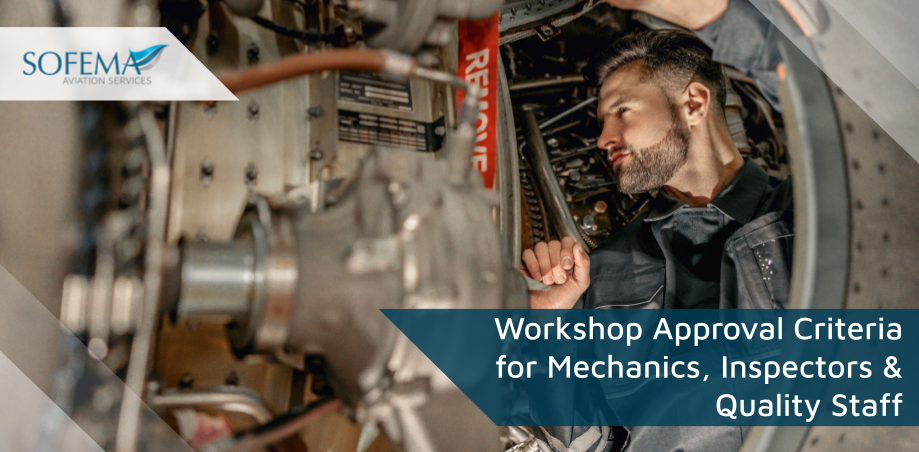Sofema Aviation Services (SAS) www.sassofia.com considers the background & framework that is relevant to EASA Third Country 145 organizations management of Mechanic, Inspector, and Auditor Competence.
- Review EASA Part 145 regulations and associated guidance material to understand the specific requirements for third-country workshop approval.
- Determine National Qualification Requirements:
o Understand the national qualification requirements for mechanics, inspectors, and auditors based on your country’s aviation authority regulations.
- Establish a Clear Scope:
o Define the scope of your assessment, focusing only on the personal national qualifications of mechanics, inspectors, and auditors.
Mechanics Qualifications Assessment:
Formal Training and Education:
- Ensure that unlicensed mechanics have received appropriate formal training in aircraft maintenance or equivalent and have completed relevant educational programs.
On-the-Job Training (OJT):
- Assess the effectiveness of on-the-job training programs to verify that unlicensed mechanics have gained practical experience under the supervision of experienced personnel.
Documentation and Record-Keeping:
- Verify that the organization maintains accurate records of training, qualifications, and work experience for each unlicensed mechanic to demonstrate compliance with regulatory requirements.
Proficiency Testing:
- Implement regular proficiency tests and assessments to evaluate the knowledge and skills of unlicensed mechanics. These tests may cover areas such as safety procedures, technical knowledge, and practical skills.
Supervision and Oversight:
- Ensure that unlicensed mechanics work under the direct supervision of licensed personnel to prevent unqualified individuals from performing critical maintenance tasks independently.
Currency of Knowledge:
- Monitor and verify that unlicensed mechanics stay up-to-date with changes in regulations, procedures, and technology related to aircraft maintenance.
Safety Awareness:
- Assess the safety awareness and culture within the organization to confirm that unlicensed mechanics prioritize safety in their work.
Compliance with Part 145 Requirements:
- Confirm that the organization and its unlicensed mechanics adhere to all EASA Part 145 requirements related to maintenance, documentation, and safety.
Continuing Education:
- Encourage unlicensed mechanics to pursue continuous education and training opportunities to enhance their skills and knowledge.
- Ensure that there is a system in place for reporting and investigating incidents, accidents, or near misses related to maintenance tasks performed by unlicensed mechanics.
English Language Proficiency:
- Verify that unlicensed mechanics have the required level of English language proficiency, as communication is critical in aviation maintenance.
Specialized Training (if applicable):
- If the organization deals with specialized equipment or aircraft types, ensure that unlicensed mechanics receive specific training for these tasks.
Inspector Qualifications Assessment:
- Ensure that inspectors meet the requirements for their roles, which may include:
- Appropriate qualification or certificates for inspection.
- Specific training on inspection procedures.
- Adequate experience in quality control and inspection.
- Familiarity with regulatory requirements and documentation.
- Ensure that inspectors are well-versed in regulatory requirements, including EASA Part 145 regulations, and can effectively interpret and apply them during inspections.
- Verify that inspectors have undergone comprehensive training on inspection procedures. This training should cover areas such as inspection techniques, quality control methods, and the use of relevant inspection equipment and tools.
- Assess the experience of inspectors to confirm that they have a sufficient track record in quality control and inspection.
o This typically includes evaluating their past work history in aviation maintenance and inspection roles.
- Continuous Education and Training:
o Encourage inspectors to engage in ongoing education and training opportunities to stay updated with evolving industry standards and best practices related to aircraft maintenance and inspection.
Quality Auditor Qualifications Assessment:
- Cross-Check with EASA Part 145 Third Country Criteria:
o Cross-reference your findings with the specific criteria outlined in EASA Part 145 for third-country workshop approval to ensure alignment.
Qualification and Certification:
- Ensure that quality auditors possess the necessary qualifications and certifications relevant to their roles as auditors.
- Verify that auditors have completed training programs or courses specifically related to auditing techniques, quality management systems, and aviation regulations.
- Assess the experience of quality auditors to ensure they have a sufficient background in auditing processes.
- Regulatory Knowledge:
o Verify that quality auditors have a strong understanding of aviation regulations, particularly EASA Part 145 and any other relevant regulations.
- Ensure auditors can effectively interpret and apply regulatory requirements during audits.
- Determine whether the Auditors are familiar with assessing the auditing methodology used by auditors, including their approach to planning, conducting, and reporting on audits.
- Confirm that auditors follow established audit procedures and standards to maintain consistency and integrity in their audit processes.
Continuing Education:
- Encourage quality auditors to engage in continuous education and training to stay updated with changing industry standards, audit techniques, and best practices.
Communication Skills:
- Verify that quality auditors possess effective communication skills, as clear communication is vital when interacting with individuals and teams during audits.
- Assess their ability to provide constructive feedback and recommendations for improvement.
Independence and Impartiality:
- Confirm that quality auditors maintain independence and impartiality during audits to ensure unbiased assessments.
- Ensure that auditors are not influenced by external factors that could compromise the integrity of the audit process.
- Confirm that quality auditors adhere to a code of conduct and ethical standards that promote professionalism and integrity in their auditing roles.
Next Steps
Follow this link to our Library to find & Download related documents for Free.
Sofema Aviation Services and Sofema Online are pleased to offer multiple courses in support of EASA Part 145 and EASA Third Country Part 145.
Please see www.sassofia.com www.sofemaonline.com or email team@sassofia.com
Tags:
Aircraft Maintenance, Assessment, auditors, Aviation Inspectors, Aviation Regulatory Requirements, comprehensive training, EASA Third Country 145, mechanics, On the Job Training (OJT), practical experience, practical skills, Quality Control, Record-keeping, Safety Awareness Training, safety procedures, SAS blogs, Workshop Approval




